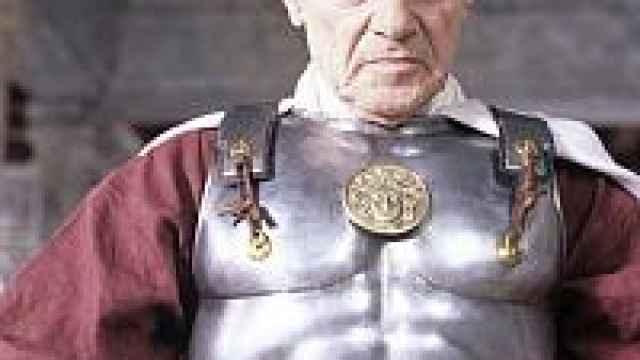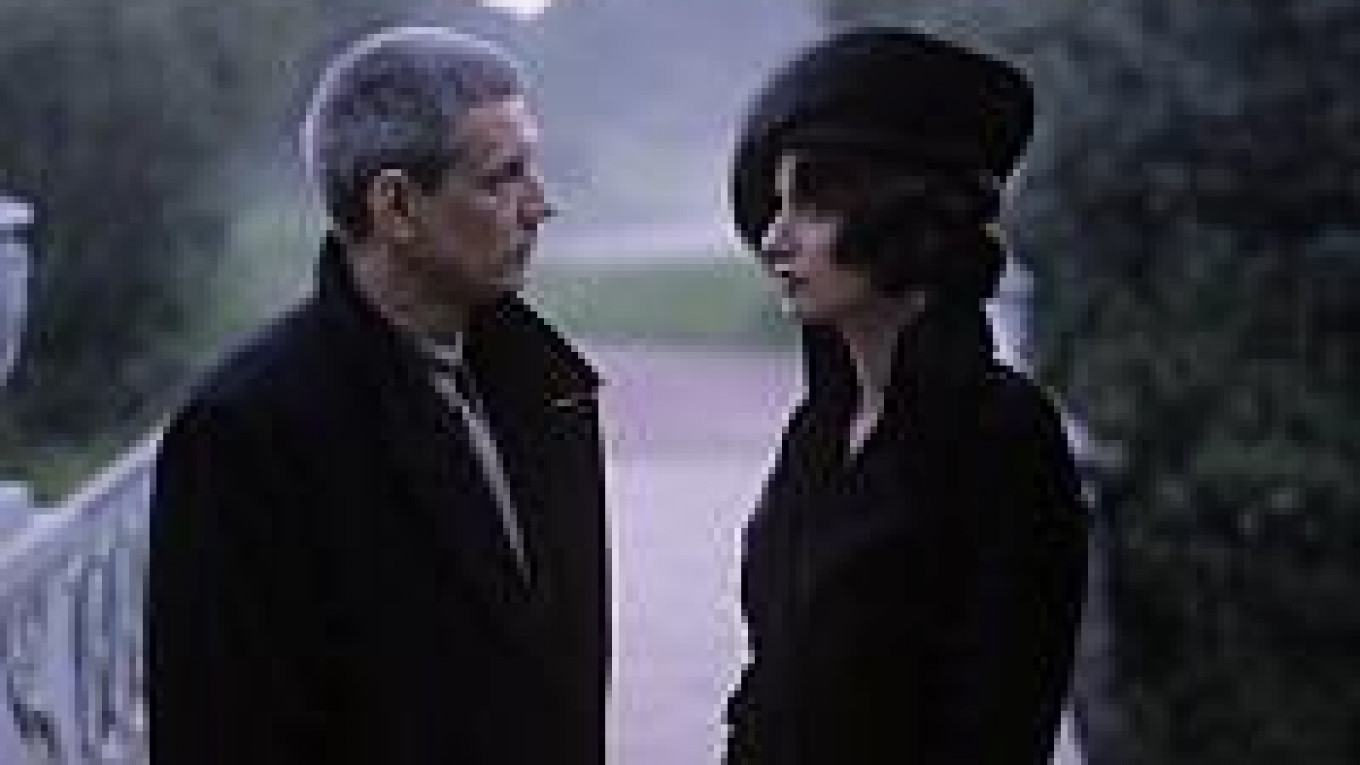Director Vladimir Bortko denied that he felt any butterflies before snippets of the big-budget miniseries were presented to journalists last week, pointing out that he has been in the film industry for almost 30 years and that he had "gotten bored of being nervous."
If anyone can successfully film a novel that many Russians name as their favorite, it would seem to be Bortko, who shot an acclaimed television version of Bulgakov's story "Heart of A Dog" in 1988, and scored both critical success and high ratings with his adaptation of Fyodor Dostoevsky's "The Idiot" in 2003.
The presentation at the Central House of Writers gave a taste of what the 10-episode series will look like. Video screens showed the famous first scene, where the devilish Woland, played by veteran actor Oleg Basilashvili, lectures the poet Bezdomny and the literary journal editor Berlioz about Jesus Christ. The director chose to film the fateful encounter at Patriarch's Ponds in sepia tones, as he did for all the 1930s scenes, while Jerusalem and the magic episodes were filmed in color.
Other extracts showcased the special-effects scenes that fill 164 minutes of the series' total running time and consumed much of its $5 million budget. There was a chance to see Margarita flying to the ball on a broomstick, a performance of "magic with an explanation" led by Woland and, most crucially of all, the giant talking cat Behemoth. The director said that the difficulty of recreating this character was one of the factors that made him refuse an offer to film "The Master and Margarita" in the 1980s.
In the series, which is to be broadcast on the Rossia television channel, Behemoth is played alternately by a real trained cat, by the diminutive actor Vano Miranyan in a furry cat suit and -- for his human incarnation -- by actor Alexander Bashirov. Russian special-effects studios also created an animated cat figure, whose gestures and voice were created by actor Semyon Furman.
"Compared with Hollywood, this is probably the Stone Age," Bortko said of the special effects in an interview before the presentation. "I don't know, but I hope it looks modern. It's hard for me to say now what a viewer will think of it if he expects something like 'Titanic' or 'The Matrix.'"
When talking about the completed work, the director cringed at the mention of the word ***serial,*** or drama series, a term that has been tarnished by countless look-alike gangster or police shows. "The Master and Margarita" is "just a very big film," he insisted. The multistranded plot, with each strand gaining new depth from the juxtaposition, makes the book impossible to abbreviate without turning it into nonsense, he believes. "As for calling it a serial, it's as much a serial as I am a Japanese man."
Bortko said that he wrote the script using only Bulgakov's words and that almost all of the novel made it into the film, although there is no voiceover. The film also follows the author's narrative technique in alternating between Jerusalem and Moscow. Although this faithfulness will please connoisseurs, the series will be understandable for someone who hasn't read the book, the director said.
The 71-year-old Basilashvili, who plays Woland, is a household name for his performances in such classic Soviet comedies as "Autumn Marathon" and "Office Romance." But he is far from the only star in a production that enlisted the cream of the crop of Russian actors for even relatively small roles. Viewers will be familiar with Alexander Abdulov, who plays the ex-choirmaster Korovyev, and Valentin Gaft, who plays the Jewish high priest Kaifa, to name just two. Bortko said at the presentation that the performance of Sergei Bezrukov as Yeshua would convince any unimpressed by the ubiquitous thespian's recent work that "in front of you now is, to put it mildly, a super-good actor."
 Rossia Pontius Pilate is played by the 80-year-old actor Kirill Lavrov in the new series. | |
The two title roles, though, are taken by an actor and actress with lower profiles than some of the other performers. Margarita is played by Anna Kovalchuk, who is best known for playing the lead role in the NTV detective series "Secrets of the Investigation," while Alexander Galibin, who plays the Master, starred in numerous films in the 1980s before dropping out of screen acting for almost a decade. Some have commented on the couple's resemblance to Bulgakov and his third wife, Yelena Shilovskaya, although at the presentation the lead actor denied that he was playing the author.
To publicize the miniseries, Rossia is organizing a parallel arts festival called "Manuscripts Don't Burn, which started last week and runs through late December. The events will range from poetry readings to performances of Soviet-era avant-garde music. An exhibition of Stalin-era memorabilia called "We Will Hang a Star on the Fir Tree" opened at the Shchusev Architecture Museum on Thursday, displaying photographs, archival film, household objects and a reconstruction of a New Year's tree circa 1936.
Rossia general director and series co-producer Anton Zlatopolsky called the production "the most difficult one in terms of time taken and nervous energy" that the channel has ever undertaken in the genre. The director was working "at the limit of human capabilities," he said.
Although Bortko's series took less than a year to shoot, his plans to film "The Master and Margarita" date back nearly a decade. He wrote the script back in 1996, then in 2000 he selected a cast and commissioned a soundtrack for a series to be shown on NTV, but this never got off the ground due to various difficulties, including financial ones. Zlatopolsky said that when Rossia decided to revive the project, they found that the Russian rights had been sold only six weeks before to the film production and distribution company Central Partnership. Luckily, the two organizations managed to come to an agreement, and filming for Bortko's series began last June.
The failure of any Russian director to complete and release a filmed version of "The Master and Margarita" to date has led some to prophesy disaster for Bortko, too. In the 1990s, Yury Kara made a filmed version, giving the role of Woland to Gaft, who plays Kaifa in Bortko's miniseries, but this has never seen the light of day. The late director Elem Klimov dreamed of filming the novel, as did Eldar Ryazanov, who is now working on what he calls his last film. The only screen versions have been a joint Italian-Yugoslav production and a film and a television series from Poland.
While some believe that Russian film versions are jinxed, Bortko has no time for mystical explanations. Instead, the director said that filming went smoothly. "People often ask me whether there were any mystical happenings. I say, yes, you should write that there was one: We started on time and finished on time. That was very mysterious."
"The Master and Margarita" (Master i Margarita) airs Mon. at 8:55 p.m. on Rossia. For the "Manuscripts Don't Burn" festival events, see the Calendar listings and www.masterimargarita.ru/news
A Message from The Moscow Times:
Dear readers,
We are facing unprecedented challenges. Russia's Prosecutor General's Office has designated The Moscow Times as an "undesirable" organization, criminalizing our work and putting our staff at risk of prosecution. This follows our earlier unjust labeling as a "foreign agent."
These actions are direct attempts to silence independent journalism in Russia. The authorities claim our work "discredits the decisions of the Russian leadership." We see things differently: we strive to provide accurate, unbiased reporting on Russia.
We, the journalists of The Moscow Times, refuse to be silenced. But to continue our work, we need your help.
Your support, no matter how small, makes a world of difference. If you can, please support us monthly starting from just $2. It's quick to set up, and every contribution makes a significant impact.
By supporting The Moscow Times, you're defending open, independent journalism in the face of repression. Thank you for standing with us.
Remind me later.


